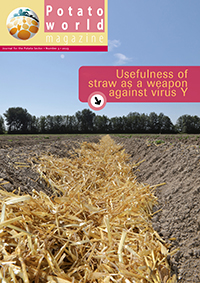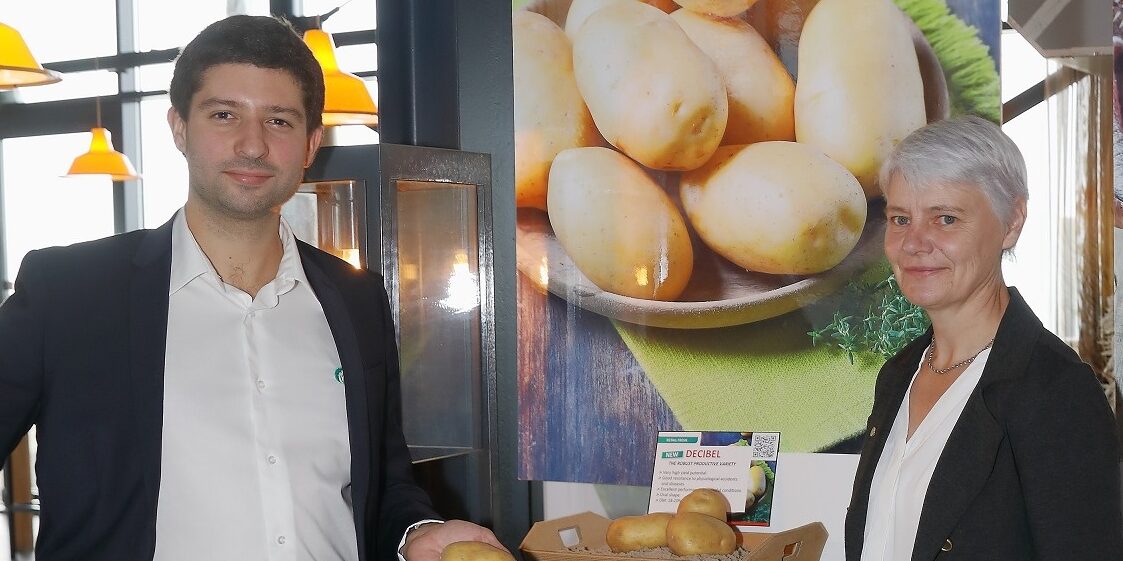Already a subscriber? Activate your premium account

Potatoworld Magazine

During the Potato Variety Days 2021, we asked participating breeding companies about the key focus of their breeders in their search for new varieties. In this blog post you may read the answer given by Gisèle Lairy-Joly, Research Manager and Vianney Gerigeon, Product Manager Germicopa, Quimper (F):
The content of this blog originates from the article on the Potato Variety Days 2021 published in PotatoWorld magazine 2022/01.
By Zindziwe Janse, Jaap Delleman and Leo Hanse.
Actually, setting breeding objectives is a “never ending process”, say Vianney Gerigeon and Gisèle Lairy-Joly. ‘Through growth in production or marketing areas, we as a seed potato trading company and breeding station can quickly gain an additional focus.’
‘Take nematode resistance, for example. Until recently, that wasn’t a breeding target in our breeding programme. The reason was that we mainly develop varieties for the French market where there’s little demand for them. For some time now, we’ve been seeing an interest in our varieties from growers in New Zealand. And there, nematodes are an issue. So you see, things can change just like that’, laughs Product Manager Gerigeon.
What Germicopa has been focusing on for some time now is abiotic plant stress, adds Research Manager Gisèle Lairy-Joly. She believes that this is a spearhead for the cultivation of starch potatoes in particular. ‘Starch potatoes grow in the worst possible soils, where irrigation is usually not possible. That’s why growers and industry are looking for varieties that are not prone to drought stress and can achieve the highest possible yield with little water. Especially now that the effects of climate change have been noticeable for some years already. For example, with an increase in the average temperature, there are more and longer periods of drought interspersed with moments of heavy rainfall. Warnings like these are discussed annually when we, as representatives of the sales and breeding departments, meet to set or adjust our breeding objectives. However, that’s not always all that easy. Phytophthora resistance is still a fairly remote issue for the French growers, especially for the table potato market, which is very important for us. They have only two important wishes, they want potatoes that look good and yield high, which means that we hardly need to focus at all in our breeding work on Phytophthora resistance for the French market. And yet we do. What’s more, we’re actually convinced that in a few years’ time, growers won’t be able to do without it. We can see political pressure on management, sales and breeding regarding the use of products only increasing. And French growers won’t escape this either. That’s why we don’t only look at current demands, but also at future ones’, explains Lairy.
What makes it extra difficult is that finding a robust table potato variety based on French grower requirements – nice skin plus high yield – isn’t easy to combine with high Phytophthora resistance. The fact that it is possible, and with even more difficult property combinations, is proved by the new Decibel variety, Gerigeon continues. ‘It is a light-skinned, firm variety with Melody blood that falls in the well-known Agata market segment. Of course with that desired smooth skin, but also with a yield like that of Agata. Furthermore, it’s stress resistant to heat and drought, with a high tolerance for Phytophthora infestans, virus Y and Yntn, scab, Pallida 2 and 3 nematodes plus Rostochiensis 1 to 4. ‘A variety that we’re very pleased with’, the product manager says proudly. ‘We hope it will do well in our own country as well as in Spain, Italy, Germany and Greece.’
Want to keep reading about the Potato Variety Days?
In the run-up to the event we published an e-book that you can download here!
Events
©2015 - 2024 Potatoworld | Webdesign and realisation COMMPRO